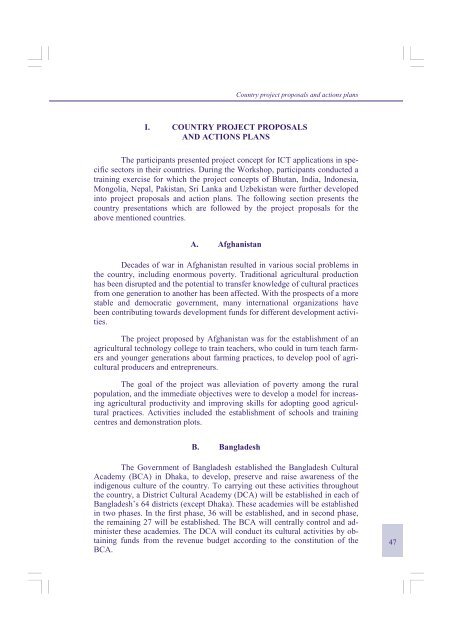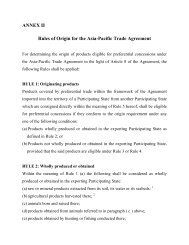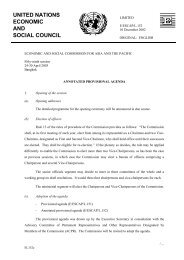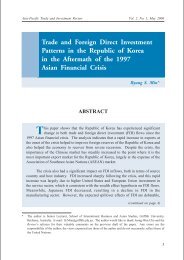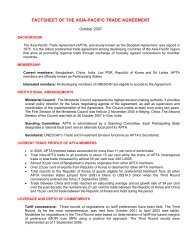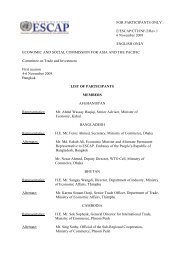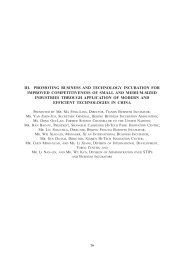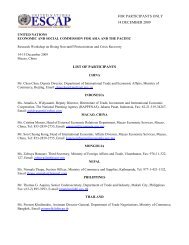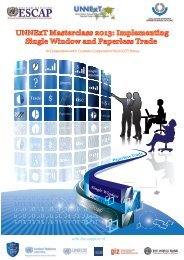Report of the Regional Workshop - Escap
Report of the Regional Workshop - Escap
Report of the Regional Workshop - Escap
You also want an ePaper? Increase the reach of your titles
YUMPU automatically turns print PDFs into web optimized ePapers that Google loves.
Country project proposals and actions plans<br />
I. COUNTRY PROJECT PROPOSALS<br />
AND ACTIONS PLANS<br />
The participants presented project concept for ICT applications in specific<br />
sectors in <strong>the</strong>ir countries. During <strong>the</strong> <strong>Workshop</strong>, participants conducted a<br />
training exercise for which <strong>the</strong> project concepts <strong>of</strong> Bhutan, India, Indonesia,<br />
Mongolia, Nepal, Pakistan, Sri Lanka and Uzbekistan were fur<strong>the</strong>r developed<br />
into project proposals and action plans. The following section presents <strong>the</strong><br />
country presentations which are followed by <strong>the</strong> project proposals for <strong>the</strong><br />
above mentioned countries.<br />
A. Afghanistan<br />
Decades <strong>of</strong> war in Afghanistan resulted in various social problems in<br />
<strong>the</strong> country, including enormous poverty. Traditional agricultural production<br />
has been disrupted and <strong>the</strong> potential to transfer knowledge <strong>of</strong> cultural practices<br />
from one generation to ano<strong>the</strong>r has been affected. With <strong>the</strong> prospects <strong>of</strong> a more<br />
stable and democratic government, many international organizations have<br />
been contributing towards development funds for different development activities.<br />
The project proposed by Afghanistan was for <strong>the</strong> establishment <strong>of</strong> an<br />
agricultural technology college to train teachers, who could in turn teach farmers<br />
and younger generations about farming practices, to develop pool <strong>of</strong> agricultural<br />
producers and entrepreneurs.<br />
The goal <strong>of</strong> <strong>the</strong> project was alleviation <strong>of</strong> poverty among <strong>the</strong> rural<br />
population, and <strong>the</strong> immediate objectives were to develop a model for increasing<br />
agricultural productivity and improving skills for adopting good agricultural<br />
practices. Activities included <strong>the</strong> establishment <strong>of</strong> schools and training<br />
centres and demonstration plots.<br />
B. Bangladesh<br />
The Government <strong>of</strong> Bangladesh established <strong>the</strong> Bangladesh Cultural<br />
Academy (BCA) in Dhaka, to develop, preserve and raise awareness <strong>of</strong> <strong>the</strong><br />
indigenous culture <strong>of</strong> <strong>the</strong> country. To carrying out <strong>the</strong>se activities throughout<br />
<strong>the</strong> country, a District Cultural Academy (DCA) will be established in each <strong>of</strong><br />
Bangladesh’s 64 districts (except Dhaka). These academies will be established<br />
in two phases. In <strong>the</strong> first phase, 36 will be established, and in second phase,<br />
<strong>the</strong> remaining 27 will be established. The BCA will centrally control and administer<br />
<strong>the</strong>se academies. The DCA will conduct its cultural activities by obtaining<br />
funds from <strong>the</strong> revenue budget according to <strong>the</strong> constitution <strong>of</strong> <strong>the</strong><br />
BCA.<br />
47


